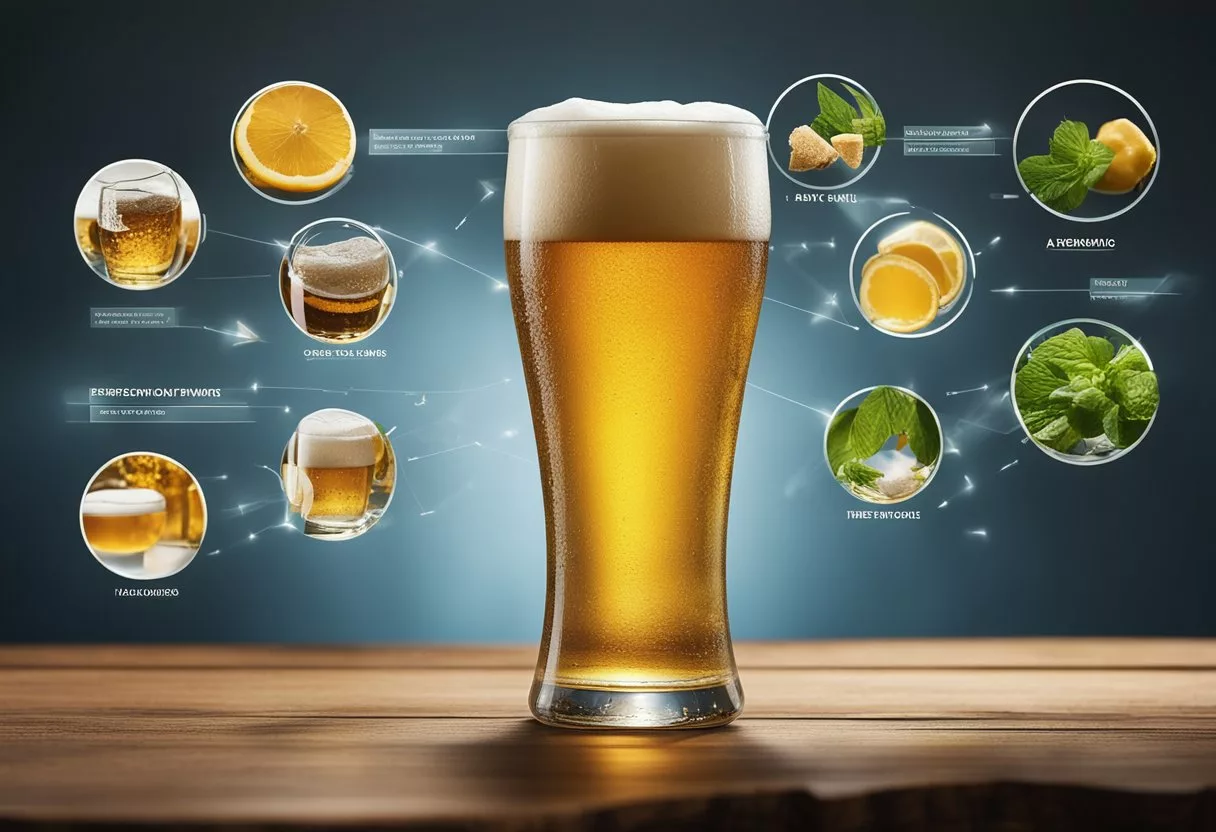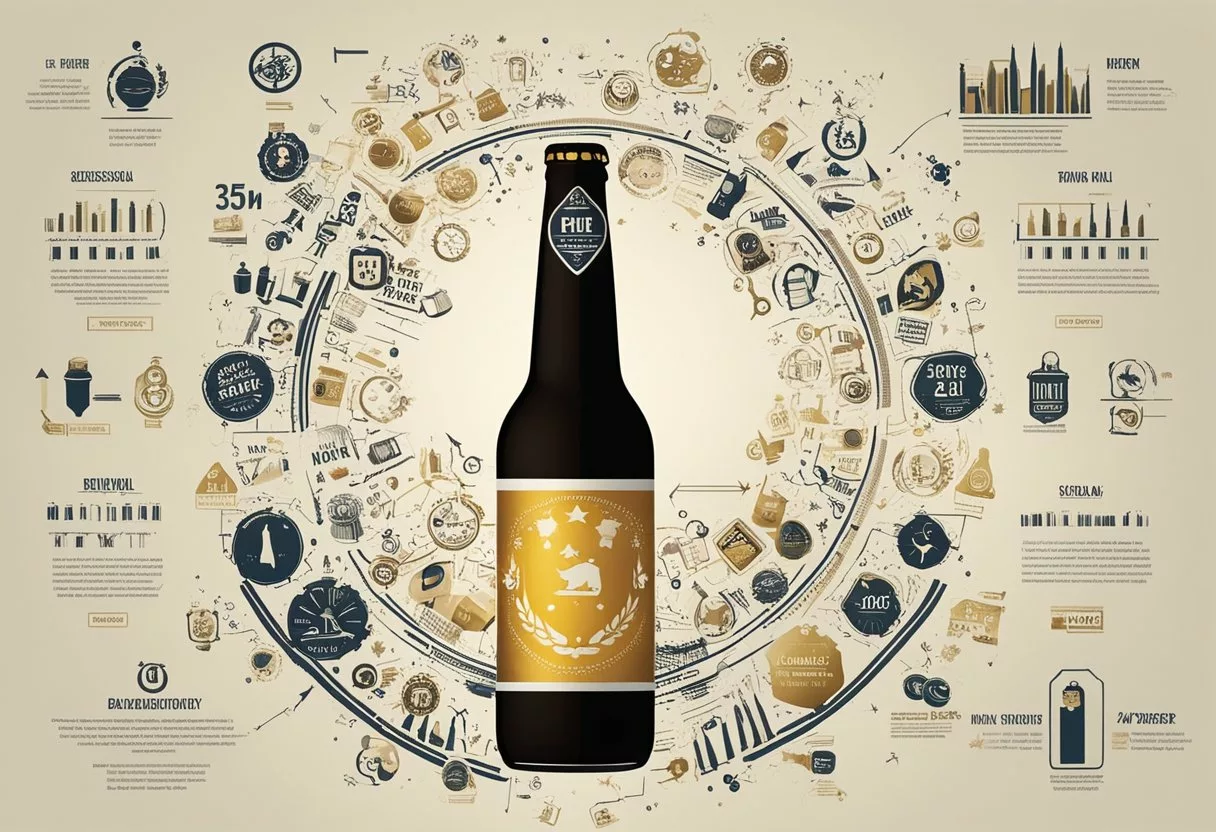Drinking beer is a common social activity that many people enjoy. However, what happens to your body if you drink beer every day? This is a question that has been asked by many people, especially those who enjoy drinking beer regularly. While moderate drinking may have some health benefits, excessive drinking can have serious consequences on your body.
The effects of drinking beer every day can vary depending on the amount of beer consumed, the frequency of consumption, and the individual’s overall health. Some research suggests that drinking beer every day can have negative effects on the liver, kidneys, and heart. For example, alcohol is a diuretic, which means it can cause dehydration and put a strain on the kidneys. Additionally, excessive drinking can lead to liver damage and increase the risk of heart disease.
Overall, it is important to understand the potential risks of drinking beer every day. While moderate drinking may have some health benefits, excessive drinking can have serious consequences on your body. It is important to drink responsibly and in moderation to maintain good health.
Understanding Beer and Its Components

Alcohol Content and Beer Types
Beer is an alcoholic beverage that is made by fermenting grains, typically malted barley, with yeast. The alcohol content in beer can vary depending on the type of beer. Generally, beer has an alcohol content of 4-6% ABV (alcohol by volume), but some beers can have an ABV as high as 10-12%. Beers are categorized into two main types: ale and lager. Ales are brewed at higher temperatures and tend to have a more complex flavor profile, while lagers are brewed at lower temperatures and have a lighter, crisper taste.
Caloric and Nutritional Profile of Beer
Beer is often associated with weight gain due to its high calorie content. A standard 12-ounce beer can have anywhere from 100-200 calories, depending on the type of beer. However, beer also contains macronutrients such as carbohydrates, protein, and fiber, as well as micronutrients such as vitamins and minerals. For example, beer is a good source of B vitamins such as vitamin B1 and vitamin B12, as well as minerals such as potassium, calcium, iron, and magnesium.
The Role of Hops, Yeast, and Malted Barley
Hops, yeast, and malted barley are the three main ingredients in beer. Hops are flowers that are added to beer to give it a bitter flavor and aroma. Yeast is a microorganism that ferments the sugars in the malted barley, producing alcohol and carbon dioxide. Malted barley is barley that has been soaked in water to start the germination process, then dried and roasted to stop the process. This process creates the sugars that the yeast ferments to produce alcohol.
In summary, beer is an alcoholic beverage that contains varying levels of alcohol depending on the type of beer. It also contains macronutrients such as carbohydrates, protein, and fiber, as well as micronutrients such as vitamins and minerals. The three main ingredients in beer are hops, yeast, and malted barley, which give beer its unique flavor and aroma.
Short-Term Effects of Daily Beer Consumption

Alcohol Metabolism and Blood Sugar Impact
When beer is consumed, the body immediately begins to metabolize alcohol. This process occurs primarily in the liver, where enzymes break down the alcohol into compounds that can be eliminated from the body. As this process occurs, blood sugar levels can be impacted, leading to fluctuations in energy levels and mood. According to EatingWell, drinking beer every day can lead to a higher risk of developing type 2 diabetes due to its impact on blood sugar levels.
Dehydration and Electrolyte Imbalance
Beer is a diuretic, meaning that it can increase urine production and lead to dehydration. This can be exacerbated if the individual consuming the beer is also not drinking enough water to stay hydrated. Additionally, beer can also lead to an imbalance of electrolytes, which are essential for proper cellular function. According to Cleveland Clinic, this can lead to symptoms such as muscle cramps, weakness, and fatigue.
Sleep Quality and Mental Health
While many people may use beer as a way to relax and unwind, it can actually have negative impacts on both sleep quality and mental health. Beer contains GABA, a neurotransmitter that can have a relaxing and sedative effect on the brain. However, this effect can also lead to disrupted sleep patterns, making it more difficult to achieve restful sleep. Additionally, excessive beer consumption has been linked to an increased risk of depression and anxiety. According to Parade, drinking beer every day can have a negative impact on overall mental health.
Overall, while beer can be enjoyed in moderation, daily consumption can have negative short-term effects on the body. These effects can include impacts on blood sugar levels, dehydration and electrolyte imbalances, and disruptions to sleep quality and mental health.
Long-Term Health Consequences

Liver Health and Disease Risks
Drinking beer every day can have serious consequences for liver health. The liver is responsible for breaking down alcohol in the body, and excessive drinking can lead to liver damage, inflammation, and scarring. According to The List, drinking beer every day can increase the risk of developing alcoholic fatty liver disease, which can progress to more serious conditions such as cirrhosis and liver cancer.
Heart Health and Cardiovascular Disease
While moderate alcohol consumption has been associated with some health benefits, such as increased HDL cholesterol levels, drinking beer every day can have negative effects on heart health. According to Verywell Health, heavy drinking can lead to high blood pressure, heart failure, and cardiomyopathy. Additionally, excessive alcohol consumption can increase the risk of developing cardiovascular diseases such as stroke and heart attack.
Weight Management and Obesity
Drinking beer every day can contribute to weight gain and obesity. Beer contains empty calories and can lead to overconsumption of calories, which can result in weight gain over time. According to EatingWell, drinking beer every day can also slow down metabolism and contribute to the development of abdominal fat, which is associated with an increased risk of chronic diseases such as diabetes and heart disease.
Cancer Risks Associated with Alcohol
According to Livestrong, drinking beer every day can increase the risk of developing certain types of cancer, including breast, liver, and colorectal cancers. Alcohol consumption has been linked to an increased risk of cancers of the digestive system, and heavy drinking can increase the risk of developing cancer even further.
In summary, drinking beer every day can have serious long-term health consequences. It can lead to liver damage, cardiovascular disease, weight gain and obesity, and an increased risk of developing certain types of cancer. While moderate alcohol consumption has been associated with some health benefits, excessive drinking can have negative effects on overall health and well-being.
Psychological and Behavioral Impact

Mental Health and Emotional Well-Being
Excessive alcohol consumption, including drinking beer every day, can have negative impacts on an individual’s mental health and emotional well-being. According to Psychology Today, alcohol can increase the risk of depression and anxiety. While some individuals may initially feel a sense of relaxation and euphoria after drinking, alcohol is a depressant that can lead to feelings of sadness, hopelessness, and despair. These effects can be particularly pronounced in individuals who already struggle with depression or anxiety.
Alcohol Dependence and Substance Abuse
Drinking beer every day can also increase the risk of developing alcohol dependence and substance abuse problems. According to the National Institute on Alcohol Abuse and Alcoholism, individuals who consume alcohol on a daily basis are at a higher risk of developing alcohol use disorder (AUD). This condition is characterized by a compulsive need to drink, even when it interferes with an individual’s daily life and responsibilities. It can also lead to physical dependence, withdrawal symptoms, and a range of negative health consequences.
Social Interactions and Risky Behaviors
Finally, drinking beer every day can have negative impacts on an individual’s social interactions and may increase the likelihood of engaging in risky behaviors. According to The List, excessive drinking can impair judgment and lead to poor decision-making. This can increase the risk of accidents, injuries, and other negative outcomes. Additionally, individuals who drink heavily may be more likely to engage in risky sexual behaviors, drive under the influence, or experience conflicts with friends and family members.
In summary, drinking beer every day can have negative impacts on an individual’s mental health, increase the risk of alcohol dependence and substance abuse, and lead to risky behaviors. It is important for individuals to monitor their alcohol consumption and seek help if they feel that their drinking habits are becoming problematic.
Effects on Digestive System and Gut Health
Gastrointestinal Inflammation and Digestion
Drinking beer every day can lead to gastrointestinal inflammation, which can cause discomfort and pain. The alcohol in beer triggers the release of inflammatory cytokines, which can cause inflammation in the gut. This inflammation can lead to digestive issues such as bloating, gas, and diarrhea. In addition, alcohol can irritate the lining of the stomach, leading to heartburn and acid reflux.
Beer can also slow down the digestive process. Alcohol can interfere with the production of digestive enzymes, which can lead to incomplete digestion and malabsorption of nutrients. This can result in nutrient deficiencies and other health problems.
Gut Microbiome and Health
The gut microbiome plays a crucial role in overall health. Drinking beer every day can have a negative impact on the gut microbiome. Alcohol can disrupt the balance of bacteria in the gut, leading to an overgrowth of harmful bacteria and a decrease in beneficial bacteria. This can lead to gut dysbiosis, which can cause a range of health problems, including digestive issues, autoimmune disorders, and mental health problems.
In addition, beer contains gluten, which can be problematic for people with gluten sensitivity or celiac disease. Gluten can damage the intestinal lining, leading to leaky gut syndrome and other health problems.
Overall, drinking beer every day can have a negative impact on digestive system and gut health. It can cause inflammation, digestive issues, and dysbiosis of the gut microbiome. It is important to consume alcohol in moderation and to prioritize gut health through a healthy diet and lifestyle.
Nutritional and Hormonal Considerations

Impact on Vitamins and Minerals
Drinking beer every day can have an impact on the body’s vitamin and mineral levels. Beer contains a small amount of B vitamins, including niacin, riboflavin, and vitamin B6. However, excessive alcohol consumption can interfere with the absorption and utilization of these vitamins, leading to deficiencies. Alcohol can also interfere with the absorption of minerals such as calcium, magnesium, and zinc. These minerals are essential for maintaining healthy bones, muscles, and immune function.
Hormonal Changes and Health Effects
Beer consumption can also have an impact on hormonal balance and overall health. Excessive alcohol intake can disrupt the body’s hormonal balance, leading to a decrease in testosterone levels in men and an increase in estrogen levels in women. This can lead to a variety of health problems, including decreased libido, infertility, and increased risk of breast cancer in women.
In addition, drinking beer every day can also lead to weight gain and an increased risk of obesity. Alcohol is high in calories and can lead to increased appetite and decreased energy levels, making it more difficult to maintain a healthy weight. Excessive alcohol consumption can also lead to fatigue and decreased physical performance, making it more difficult to exercise and stay active.
Overall, while moderate beer consumption may have some health benefits, drinking beer every day can have negative effects on nutritional and hormonal balance, as well as overall health and well-being.
Comparing Moderate and Excessive Drinking

Defining Moderate Beer Drinking
Moderate beer drinking is defined as consuming up to one drink per day for women and up to two drinks per day for men, according to the Dietary Guidelines for Americans. One drink is defined as 12 fluid ounces of regular beer, which contains about 5% alcohol.
Consequences of Excessive Drinking
Excessive beer drinking, on the other hand, can have serious consequences on one’s health. According to the Centers for Disease Control and Prevention (CDC), excessive drinking is defined as consuming more than four drinks on any single day or more than 14 drinks per week for men, and more than three drinks on any single day or more than seven drinks per week for women.
Excessive drinking can lead to alcohol dependence, liver disease, high blood pressure, heart disease, stroke, and even death. Binge drinking, which is defined as consuming a large amount of alcohol in a short period of time, can also have negative effects on one’s health.
Non-Alcoholic Beer as an Alternative
For those who want to enjoy the taste of beer without the negative effects of alcohol, non-alcoholic beer can be a good alternative. Non-alcoholic beer contains less than 0.5% alcohol by volume, which is significantly lower than regular beer.
Non-alcoholic beer can provide some of the health benefits of regular beer, such as reducing the risk of heart disease, without the negative effects of excessive alcohol consumption. It can also be a good option for those who want to maintain a healthy lifestyle and avoid the negative effects of excessive drinking.
In summary, moderate beer drinking can provide some health benefits, while excessive drinking can have serious consequences on one’s health. Non-alcoholic beer can be a good alternative for those who want to enjoy the taste of beer without the negative effects of alcohol. It is important to consume alcohol in moderation and to always prioritize one’s health and well-being.
Preventive Measures and Healthier Choices
Guidelines for Responsible Drinking
While moderate alcohol consumption may have some health benefits, excessive consumption can lead to negative health consequences. To maintain a healthy lifestyle, it is important to follow guidelines for responsible drinking. The Dietary Guidelines for Americans recommend that men consume no more than two drinks per day and women consume no more than one drink per day [1]. It is important to note that these guidelines refer to standard drinks, which contain approximately 14 grams of pure alcohol.
To put this into perspective, a standard drink of beer is typically 12 ounces, while a standard drink of wine is typically 5 ounces. It is also important to pace oneself while drinking and to avoid binge drinking, which is defined as consuming four or more drinks for women and five or more drinks for men in a two-hour period [2].
Incorporating Healthy Habits
In addition to following guidelines for responsible drinking, incorporating healthy habits into one’s lifestyle can help mitigate the negative effects of alcohol consumption. Maintaining a balanced and nutritious diet, as recommended by the Dietary Guidelines for Americans, can help support overall health [1].
Regular exercise can also help improve health outcomes and may help reduce the risk of certain health conditions associated with alcohol consumption [3]. Additionally, getting enough sleep and managing stress can help support overall health and well-being.
In conclusion, while moderate alcohol consumption may have some health benefits, excessive consumption can lead to negative health consequences. Following guidelines for responsible drinking and incorporating healthy habits into one’s lifestyle can help mitigate the negative effects of alcohol consumption and support overall health.
References:
- U.S. Department of Health and Human Services and U.S. Department of Agriculture. Dietary Guidelines for Americans 2020-2025. 9th Edition. December 2020.
- National Institute on Alcohol Abuse and Alcoholism. Alcohol Facts and Statistics. https://www.niaaa.nih.gov/publications/brochures-and-fact-sheets/alcohol-facts-and-statistics. Accessed July 15, 2021.
- Schrieks IC, Wei MY, Rimm EB, et al. Bidirectional associations between alcohol consumption and cardiovascular disease: a Mendelian randomization study. Circulation. 2019;140(8).